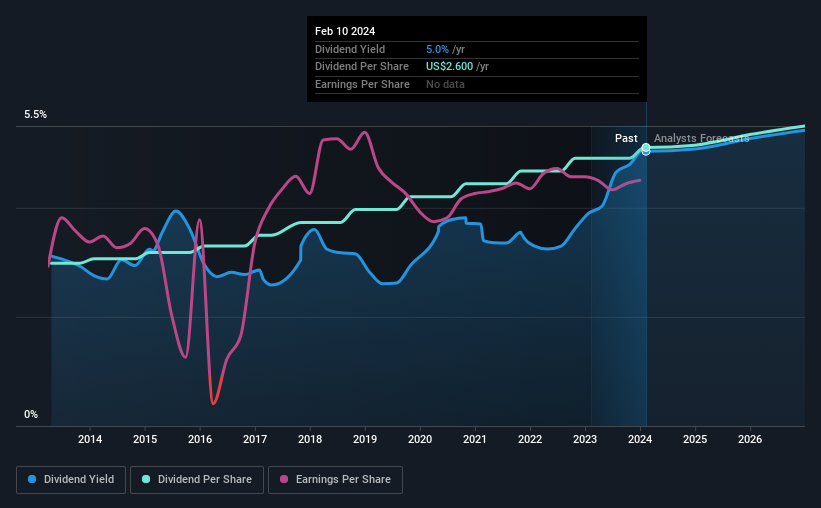It Might Not Be A Great Idea To Buy Black Hills Corporation (NYSE:BKH) For Its Next Dividend
Black Hills Corporation (NYSE:BKH) is about to trade ex-dividend in the next 4 days. The ex-dividend date occurs one day before the record date which is the day on which shareholders need to be on the company's books in order to receive a dividend. The ex-dividend date is important because any transaction on a stock needs to have been settled before the record date in order to be eligible for a dividend. Meaning, you will need to purchase Black Hills' shares before the 15th of February to receive the dividend, which will be paid on the 1st of March.
The company's upcoming dividend is US$0.65 a share, following on from the last 12 months, when the company distributed a total of US$2.60 per share to shareholders. Based on the last year's worth of payments, Black Hills has a trailing yield of 5.0% on the current stock price of US$51.62. If you buy this business for its dividend, you should have an idea of whether Black Hills's dividend is reliable and sustainable. As a result, readers should always check whether Black Hills has been able to grow its dividends, or if the dividend might be cut.
Check out our latest analysis for Black Hills
If a company pays out more in dividends than it earned, then the dividend might become unsustainable - hardly an ideal situation. Black Hills paid out 64% of its earnings to investors last year, a normal payout level for most businesses.
Click here to see the company's payout ratio, plus analyst estimates of its future dividends.
Have Earnings And Dividends Been Growing?
Businesses with shrinking earnings are tricky from a dividend perspective. If earnings decline and the company is forced to cut its dividend, investors could watch the value of their investment go up in smoke. That's why it's not ideal to see Black Hills's earnings per share have been shrinking at 4.6% a year over the previous five years.
We'd also point out that Black Hills issued a meaningful number of new shares in the past year. It's hard to grow dividends per share when a company keeps creating new shares.
The main way most investors will assess a company's dividend prospects is by checking the historical rate of dividend growth. In the past 10 years, Black Hills has increased its dividend at approximately 5.5% a year on average. Growing the dividend payout ratio while earnings are declining can deliver nice returns for a while, but it's always worth checking for when the company can't increase the payout ratio any more - because then the music stops.
The Bottom Line
From a dividend perspective, should investors buy or avoid Black Hills? We're not overly enthused to see Black Hills's earnings in retreat at the same time as the company is paying out more than half of its earnings as dividends to shareholders. In sum this is a middling combination, and we find it hard to get excited about the company from a dividend perspective.
So if you want to do more digging on Black Hills, you'll find it worthwhile knowing the risks that this stock faces. To help with this, we've discovered 2 warning signs for Black Hills (1 doesn't sit too well with us!) that you ought to be aware of before buying the shares.
Generally, we wouldn't recommend just buying the first dividend stock you see. Here's a curated list of interesting stocks that are strong dividend payers.
Have feedback on this article? Concerned about the content? Get in touch with us directly. Alternatively, email editorial-team (at) simplywallst.com.
This article by Simply Wall St is general in nature. We provide commentary based on historical data and analyst forecasts only using an unbiased methodology and our articles are not intended to be financial advice. It does not constitute a recommendation to buy or sell any stock, and does not take account of your objectives, or your financial situation. We aim to bring you long-term focused analysis driven by fundamental data. Note that our analysis may not factor in the latest price-sensitive company announcements or qualitative material. Simply Wall St has no position in any stocks mentioned.

